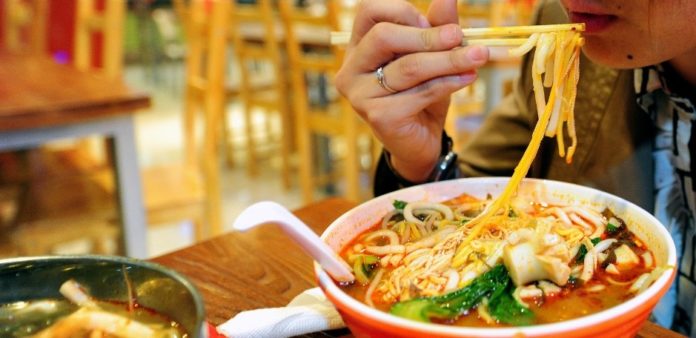
The China FDA has shut down 35 popular restaurants across China for illegally spiking their food with opiates like morphine, codeine, and noscapine to make it more addictive, hooking customers. According to the regulator, dozens of restaurants were under investigation for seasoning noodles, hotpot, grilled fish, and fried chicken with the substance, and five of the establishments had already been prosecuted.
Beyond #MSG: 35 Chinese restaurants accused of using #opiates on their food https://t.co/1W0tE346yF #opium pic.twitter.com/oMWy2q9g71
— Sputnik (@SputnikInt) January 23, 2016
Lacing food with poppies and ground poppy powder is in violation of Article 34 of the Food Safety Law, which bans among other things, production and distribution of:
A. food made with non-food raw material or added with chemicals other than food additives or other substances which may possibly be hazardous to human health, or food produced from cycled food as raw material and food, food additives; and
B. food related products containing pathogenic microorganisms, pesticide residues, veterinary drug residues, biotoxins, heavy metals, contaminants, and other substances which may possibly be hazardous to human health and which exceed the limits of the food safety standard.
Article 144 of the People’s Republic of China Criminal Law categorically states:
Whoever produces, sells foods that are mixed with poisonous or harmful non-food materials or knowingly sells such things is to be sentenced to not more than five years of fixed-term imprisonment or criminal detention and may in addition or exclusively be sentenced to a fine of not less than 50 percent and not more than 200 percent of the sale amount.
It used to be said that MSG used in restaurant Chinese food was addictive. Opium would be better – for business. https://t.co/oa8nPiHeSS
— Rita Banerji (@Rita_Banerji) January 22, 2016
Despite these measures, restaurants in China unabashedly sprinkle ground poppy powder in soup and seafood. In 2014, a Chinese noodle vendor in Shaanxi province was detained after he admitted to have added powdered poppy plant to his dishes, keeping customers coming back. In 2012, seven restaurants in Ningxia province were closed for using opium poppies. In 2004, Guizhou province shut down 215 restaurants for adding poppy and morphine to soups and hotpot stews.
Poppy powder, a derivative of highly addictive and illegal opium, when mixed with chili oil or Chinese salt is extremely difficult to detect, which is why many restaurants have gotten away with lacing foods with the additive. Long-term exposure – even in low quantities – can lead to drug addiction.
“Consuming soup or hot pots mixed with poppies for a long time will make you become addicted … and eventually lead you to drug abuse in serious cases,” said Wei Tao, deputy chief of the Food Institute with Guizhou Provincial Centre for Disease Control.
Of late, several high profile scandals, including tainted baby milk, fake meat and seafood pumped with gelatin, have plagued China. In 2014 a Shanghai-based supplier was found to have sold unsanitary and expired chicken meat to food chains including KFC, Starbucks and McDonald’s. In 2008, six children died and nearly 300,000 babies suffered “urinary system abnormalities” after drinking formula milk powder contaminated with melamine, an industrial chemical used to make plastics and fertilizer.
This article (To Draw Customers, Chinese Restaurants Laced Food With Opiates) is a free and open source. You have permission to republish this article under a Creative Commons license with attribution to the author and AnonHQ.com.





Why don’t you go check your American Macdonald and KFC! They have many restaurants!
sais pays sont diabolique pour empoisonner tous ceux qui vienne chez eux
panorama synergy has invented a device that can tell you whats in the food without even touching the food every ingredient its going to be in mobile phones soon its estimated the invention is worth billions http://www.panoramasynergy.com
The Panorama Synergy device is still a university research project. There is no evidence that it will be in mobile phones soon (or ever). The billion dollar valuation is baseless speculation.
A dash of heroin goes nice with the cat and dog meat dinners!